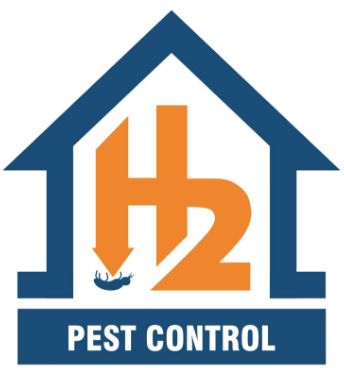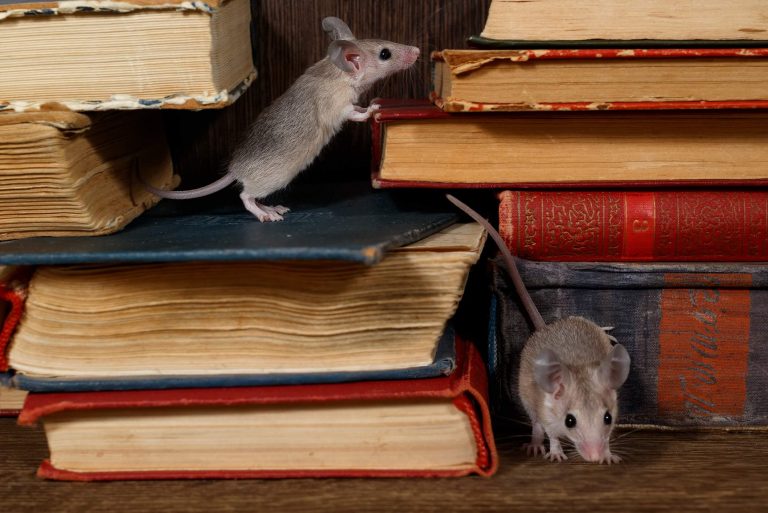Mouse droppings are one of the most common and easily identifiable signs of a rodent problem.
Recognizing what mouse poop looks like can help you detect an infestation early, preventing further damage and potential health risks.
These small, pellet-like droppings are often found near food sources, nesting areas, or along the paths mice travel.
Knowing how to identify and distinguish mouse poop from other types of rodent droppings is helpful to addressing the issue before it becomes a bigger problem.
Let’s take a deeper dive.
Mouse Poop Size, Shape, and Color
Mouse droppings are small, typically measuring between 1/8 and 1/4 inch in length, and are shaped like tiny pellets.
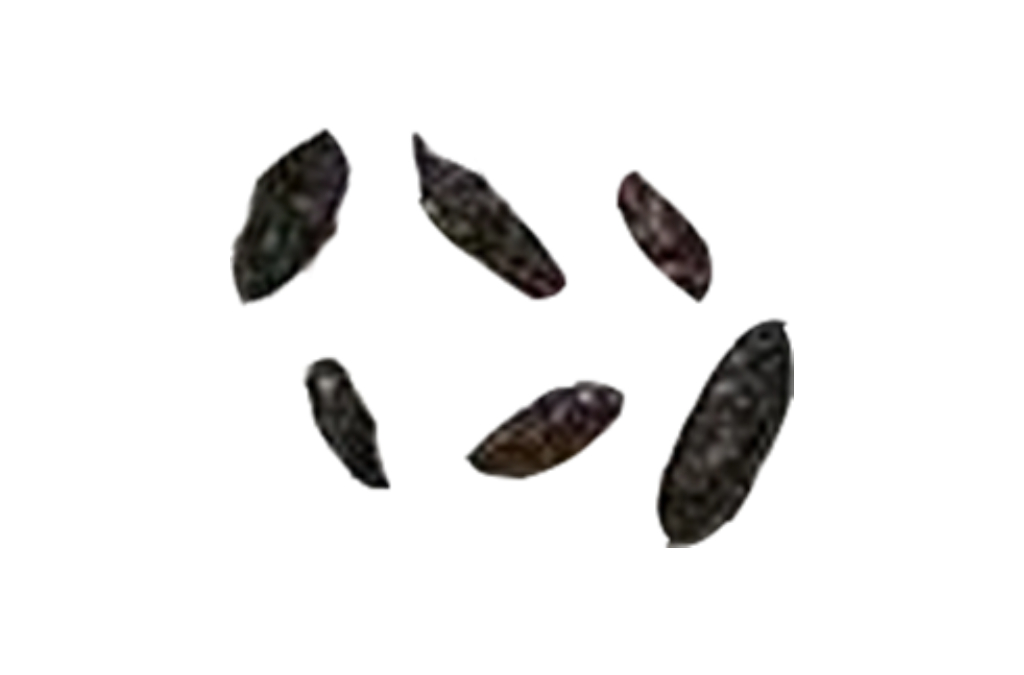
They are generally uniform in size, with pointed ends that distinguish them from the rounded or blunt droppings of other rodents. Fresh droppings are dark in color, often black or very dark brown, with a shiny, moist appearance.
As they age, mouse droppings dry out and become lighter in color, turning grayish or dusty brown, and their texture becomes hard and crumbly.
You’ll usually find these droppings scattered along walls, near food sources, or around areas where mice nest or travel frequently.
How Often Do Mice Poop?
Mice are frequent poopers, producing droppings throughout the day due to their high metabolism and constant eating habits.
On average, a single mouse can produce between 50 to 75 droppings per day. Because mice are small and constantly foraging, they tend to leave droppings wherever they travel, which means you’ll often find droppings scattered along their common paths or near food sources.
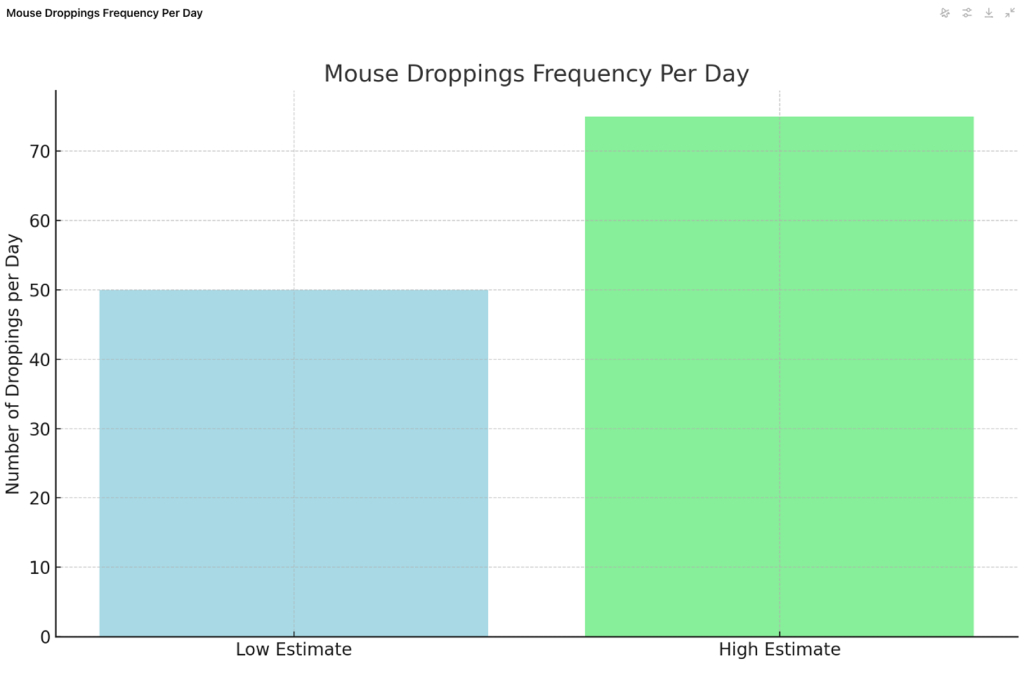
The frequent droppings are one of the clearest signs of an active infestation, as they accumulate quickly in areas where mice are feeding or nesting.
Regularly finding fresh droppings indicates the presence of active mice, signaling that immediate action is needed to control the situation.
Where to Find Mouse Droppings
Mouse droppings outside a house are a sign that rodents are active around the exterior, and it’s essential to address this before they make their way inside.
You can often find mouse droppings in areas like garages, sheds, and outdoor storage spaces, especially where food or garbage is stored. Around the foundation of the house, droppings may be found near gaps or cracks where mice might be entering.
Other common areas include around trash bins, garden beds, and under decks or porches, where mice might seek shelter.
If droppings are present near entry points or in outdoor spaces like these, it’s a good indication that mice are foraging nearby or nesting close to the home. Sealing entry points and maintaining clean, clutter-free outdoor areas can help prevent an infestation indoors.
Inside a house, mouse droppings are commonly found in areas where mice are active, such as behind appliances, inside cabinets, along baseboards, and in hidden corners where they travel or nest.
Kitchens, pantries, and attics are particularly prone to infestation since these areas offer easy access to food and shelter. You might find droppings in drawers, cupboards, or even under furniture.
In places with heavy mouse activity, you may notice multiple droppings clustered together, along with other signs such as gnaw marks on food packaging or wood, shredded nesting materials, and greasy rub marks along walls where mice travel frequently.
These indicators point to a more significant infestation, requiring immediate attention to prevent further damage.
Does Mouse Poop Smell?
While mouse droppings themselves don’t produce a particularly strong odor, they can often be associated with a musty or unpleasant smell.
This smell is typically due to the urine and other waste products that accompany the droppings.
Additionally, if the droppings have been present for a prolonged period, they may decompose, releasing a more pungent odor. It’s important to note that this odor may be subtle, especially in small infestations, but it can become more noticeable as the infestation grows.
Cleaning Up Mouse Poop
When cleaning up mouse poop, it’s essential to take precautions to avoid exposure to harmful bacteria and viruses that may be present.
Always wear gloves, and if possible, a mask to prevent inhaling dust particles. Avoid sweeping or vacuuming the droppings directly, as this can spread harmful particles into the air.
Instead, dampen the droppings and surrounding area with a disinfectant solution, then carefully pick them up using paper towels or a disposable cloth.
After disposal, thoroughly disinfect the area and wash your hands well with soap and water. It’s also important to check for other signs of infestation and seal any entry points to prevent further issues.
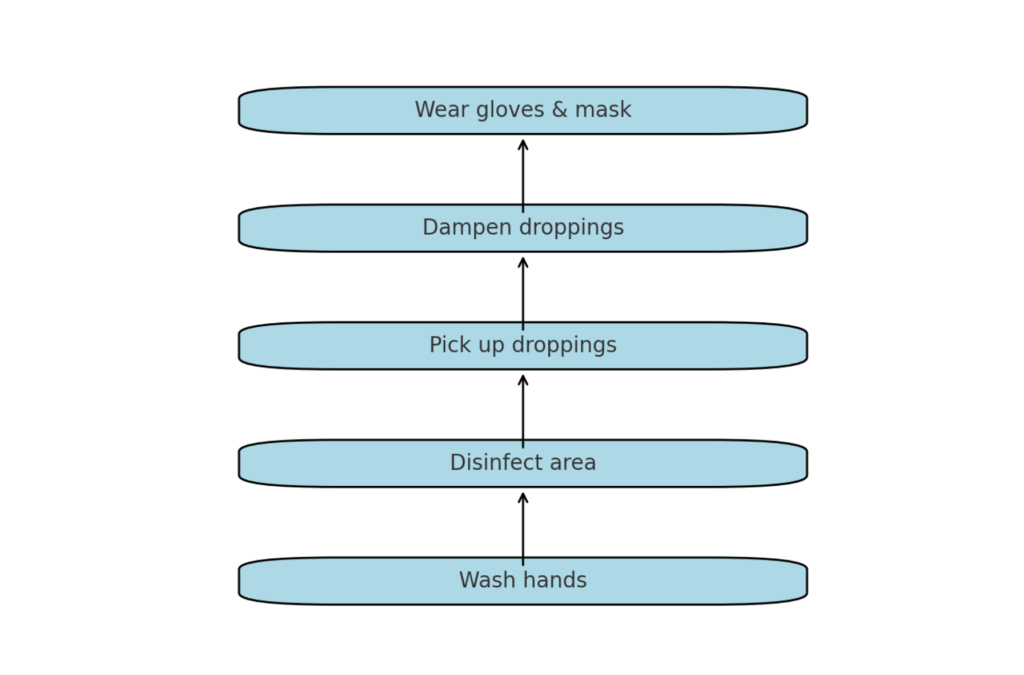
The Dangers of Mouse Droppings
Mouse droppings can pose significant health risks to humans. They are often contaminated with harmful bacteria, such as salmonella, hantavirus, and E. coli.
These pathogens can cause various illnesses, including food poisoning, respiratory infections, and kidney failure.
Additionally, mice droppings can trigger allergic reactions in some individuals, leading to symptoms like sneezing, coughing, and itchy eyes.
It’s important to note that the risk of contracting a disease from mouse droppings increases with the severity of the infestation and the length of exposure.
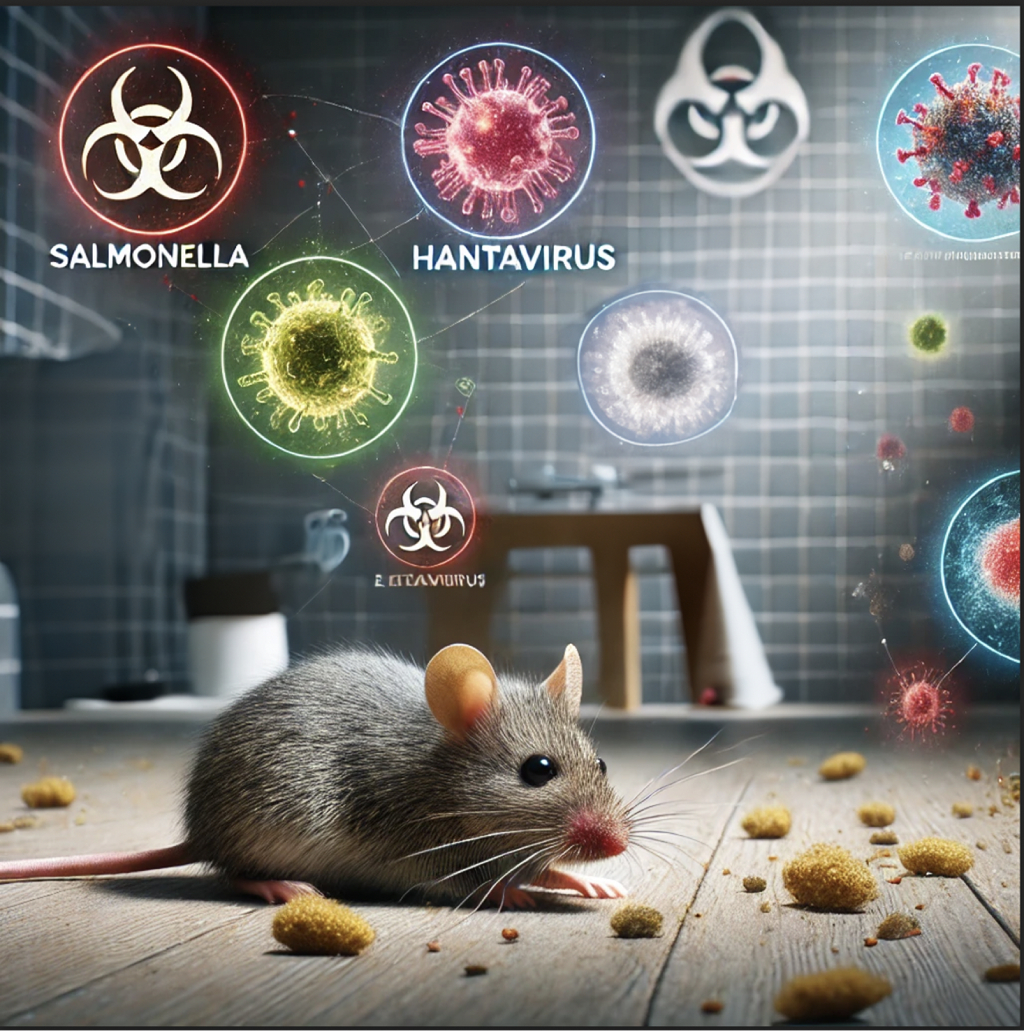
Mice Poop FAQs
If you discover mouse droppings, it’s important to handle them carefully as they can pose health risks. Here are the steps to follow:
- Ventilate the area: Open windows to allow fresh air to circulate for at least 30 minutes before cleaning.
- Wear gloves and a mask: To avoid direct contact with droppings, use disposable gloves and a mask to protect against dust particles.
- Do not sweep or vacuum: Sweeping or vacuuming can stir up harmful particles. Instead, spray the droppings with a disinfectant or bleach solution (1 part bleach to 10 parts water).
- Wipe carefully: Use paper towels or disposable cloths to wipe up the droppings after spraying.
- Dispose properly: Seal the waste in a plastic bag and dispose of it in a trash bin. Disinfect the area afterward.
- Check for entry points: Inspect your home or area for any potential points where mice could be entering and seal them to prevent further infestations.
Yes, mice droppings can be harmful to humans. They can carry bacteria, viruses, and parasites, including:
- Hantavirus: This is a potentially serious respiratory disease contracted through inhaling particles from infected mouse droppings or urine.
- Salmonella: Contact with mouse droppings can spread salmonella, leading to food poisoning and gastrointestinal issues.
- Leptospirosis: Mice urine and droppings can spread leptospirosis, a bacterial infection that can cause flu-like symptoms. It’s important to clean up mouse droppings properly to avoid health risks.
No, mice do not leave a single dropping. They can leave between 50 and 80 droppings per day. These droppings are usually scattered in areas where mice are active, such as along walls, near food sources, or in dark, hidden places. The presence of multiple droppings is often one of the first signs of a mouse infestation.
Mice are nocturnal creatures, meaning they are most active during the night when humans are less likely to see them. They are also very good at hiding and move quickly, which makes them hard to spot during the day. Even if you don’t see the mice themselves, the presence of droppings is a clear indicator that they are nearby and active in your space.
For questions to common mice problems in Utah, contact H2 Pest Control or see the following links as resources:
Fastest Way to Get Rid of Mice
6 Dangers Behind Having Mice in Your Home
6 Effective Ways to Crush a Mice Infestation Before Fall Hits
"My family has been an H2 customer for about 6 months. We built a home in Saratoga Springs, in an area that has a lot of insects and spiders. After seeing a few spiders in the house, we decided to use their services. They were prompt to respond, and very professional. I have not seen any spiders in our house since that time. We have called them for a few other issues (mice and may flies) and they always come right out and help. The staff are very friendly, very helpful and very professional. They never seem bothered by us calling and always ask us to call if something else is needed. They seem to value their customers very much, and they strive to provide a great product. I would highly recommend them based on my experiences."
-Brett H.
“These guys are seriously the best! We’ve worked with them since 2017 in our townhome in Eagle Mountain to now when we moved to Sandy! They just came to treat our new home and I feel so much better knowing we’re covered again!
We never saw any bugs at the last place, and two days after we told them we were worried about mice at the townhome, they were there taking care of it.
Amazing customer service and always very thorough!”
-Sierra M.

